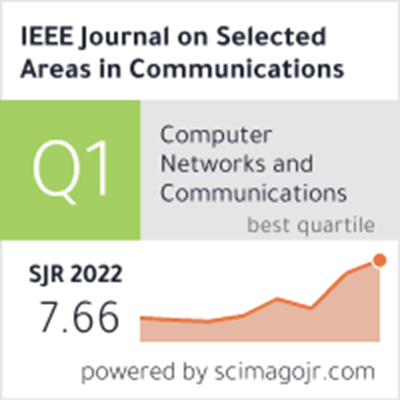移动网络中服务功能链的QoS感知和可靠流量导向
IF 13.8
1区 计算机科学
Q1 ENGINEERING, ELECTRICAL & ELECTRONIC
IEEE Journal on Selected Areas in Communications
Pub Date : 2017-10-05
DOI:10.1109/JSAC.2017.2760158
引用次数: 41
摘要
不断增长的移动流量激发了在移动网络中部署容量和性能增强的网络服务。由于网络功能虚拟化的最新进展,这样的网络服务可以作为软件组件灵活且经济高效地部署在移动网络中,从而避免了昂贵的硬件部署的需要。然而,这带来了对服务功能链的需求,从而使网络规划复杂化。在本文中,我们通过软件定义的方法研究移动网络规划,同时考虑不同类别流量的服务质量和可靠性。我们定义并公式化了移动网络中服务功能链接的流量导向问题,该问题是$\mathcal{NP}$困难的。然后,我们为该问题开发了一个快速近似方案,并通过大量的模拟实验评估其性能。结果表明,我们的算法接近最优,并且与基线算法相比取得了更好的性能。本文章由计算机程序翻译,如有差异,请以英文原文为准。
QoS-Aware and Reliable Traffic Steering for Service Function Chaining in Mobile Networks
The ever-increasing mobile traffic has inspired deployment of capacity and performance enhancing network services within mobile networks. Owing to recent advances in network function virtualization, such network services can be flexibly and cost-efficiently deployed in the mobile network as software components, avoiding the need for costly hardware deployment. Nevertheless, this complicates network planning by bringing the need for service function chaining. In this paper, we study mobile network planning through a software-defined approach, considering both quality-of-service and reliability of different classes of traffic. We define and formulate the traffic steering problem for service function chaining in mobile networks, which turns out to be $\mathcal {NP}$ -hard. We then develop a fast approximation scheme for the problem, and evaluate its performance via extensive simulation experiments. The results show that our algorithm is near-optimal, and achieves much better performance compared with baseline algorithms.
求助全文
通过发布文献求助,成功后即可免费获取论文全文。
去求助
来源期刊
CiteScore
30.00
自引率
4.30%
发文量
234
审稿时长
6 months
期刊介绍:
The IEEE Journal on Selected Areas in Communications (JSAC) is a prestigious journal that covers various topics related to Computer Networks and Communications (Q1) as well as Electrical and Electronic Engineering (Q1). Each issue of JSAC is dedicated to a specific technical topic, providing readers with an up-to-date collection of papers in that area. The journal is highly regarded within the research community and serves as a valuable reference.
The topics covered by JSAC issues span the entire field of communications and networking, with recent issue themes including Network Coding for Wireless Communication Networks, Wireless and Pervasive Communications for Healthcare, Network Infrastructure Configuration, Broadband Access Networks: Architectures and Protocols, Body Area Networking: Technology and Applications, Underwater Wireless Communication Networks, Game Theory in Communication Systems, and Exploiting Limited Feedback in Tomorrow’s Communication Networks.

 求助内容:
求助内容: 应助结果提醒方式:
应助结果提醒方式:


